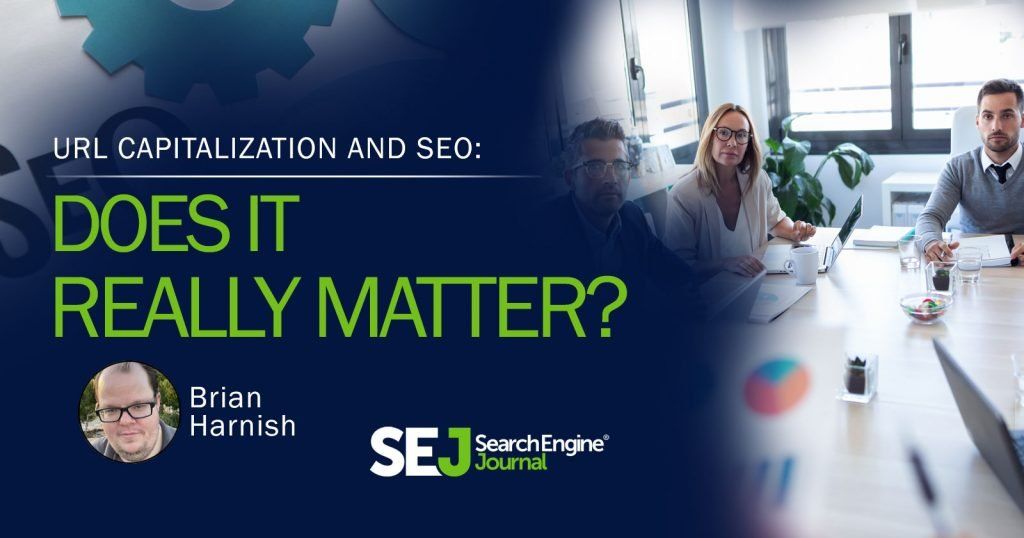In SEO, there are many long-running debates.
That’s why the term “it depends” gets thrown around so often in our industry when answering questions.
One such topic of debate: does URL capitalization really matter for SEO?
Read on as we try to clear up some of the confusion.
John Mueller Says URL Case Doesn’t Matter
While I think this is an oversimplification of matters, let’s take into consideration what Jennifer Slegg says:
“So Google doesn’t consider letter case in itself as an SEO issue, but you should keep it consistent across individual URLs, because Google considers URLs to be case-sensitive. This means, if you have the same page accessible and indexable (without canonicals) as example.com/PAGE.html and example.com/page.html, Google could crawl both those URLs and the one you want to be ranked may not be the one Google chooses. You could also end up splitting ranking signals between the two pages.
That being said, many feel that URLs that utilize upper case letters or all CAPS, with the exception of the domain name itself for style reasons, can look messy. And if it is a URL someone might type into a browser, most would default to entirely lower case, rather than using capital letters, something that might be important for those who do offline marketing too.”
She has a point. If you use capitalizations in URLs across your site in addition to normal URLs, it can create a situation where you are self-creating duplicate content.
And this duplicate content is what can hurt you.
This is especially true if you link to these URLs, and you don’t pay attention to your URLs when linking.
While doing so on a smaller scale cannot necessarily harm you, if done en masse on a large enough scale, it can cause significant damage to your SERP performance.
That’s why it’s important to consider different situations and how these URLs can create duplicate content issues through capitalization if you don’t handle them correctly.
Many SEO professionals agree that you should:
Abramillar.com says the following about URL capitalization and how it can impact SEO:
“Case sensitivity in URLs only becomes an issue for SEO when (or if) multiple versions of your URLs get found by search engines. If the URL doesn’t automatically resolve to a version without capitals, and you have shared links that sometimes include capital letters and sometimes don’t, then you are going to start having a problem.
Search engines crawl the individual pages of your website and assign trust and authority to each of these based on many factors (including links to your website). If, for example, you have two pages for every page of your website, you would be sharing the trust and authority assigned between two, rather than consolidating it all into the one version of each page.”
As you can see, many situations exist where URL capitalization can interfere with your website’s performance in the SERPs.
And while Mueller says you can pick whatever you want, this is what he is really saying:
The thing about Twitter is, that you have only a small amount of space to explain everything, and it would be counterproductive to list every single consideration over a series of tweets.
There is another issue that abramillar.com brings up, and that is the issue of excessive 404s being created and generating many versions of a URL within Google Analytics:
“Along with the page authority of your pages and authority of your website as a whole, URLs including uppercase letters are also likely to be reported separately by Google Analytics and, as mentioned above, might end in 404 errors on the wrong server.”
One discussion over at the Moz community talks about how using URL capitalization can be a problem on a site:
“I have multiple URLs that SEOMoz is reporting as duplicate content. The reason is that there are characters in the URL that may, or may not, be capitalized depending on user input.
A couple examples are:
www.websitedomain.com/Pennsylvania/Houses-for-sale
www.websitedomain.com/Pennsylvania/houses-for-sale
www.websitedomain.com/Pennsylvania/Houses-for-rent
www.websitedomain.com/Pennsylvania/houses-for-rent
There are currently thousands of instances of this on the site.
Is this something I should spend effort to try and resolve (may not be minor effort), or should I just ignore it and move on?”
Marcus Miller suggests the following solution for handling these duplicate URLs:
This random question was posed to John Mueller by a user on Twitter, which Barry Schwartz covered over on SERoundtable.com. I wanted to include it here for completeness’ sake:
This is definitely a funny way of addressing URLs and capitalization, but Mueller has a point – capitalized URLs won’t help you and can likely hurt you if you use them without discrimination and without careful consideration of what these URLs are really doing. Schwartz writes:
“Normally when people use CAPS in their communication, it is either (a) they want to be loud or (b) they have no idea how to turn off the caps lock.
Google doesn’t know that you want to be loud when you use caps in your URLs. In fact, I believe Google recommends lowercase URLs because case technically can make for a different URL.
But overall, lower case or upper case, it is all the same. When it comes to URLs, I’d stick to lower-case, but it won’t hurt you either way.”
A discussion over at StackOverflow.com has some unique technical insights into the viability of URL capitalization and why it can cause serious issues with your SEO implementation:
“I’ve visited many sites that most of them used lowercase in URLs like
stackoverflow.com/questions
google.com/webmaster
bing.com/news
Why using uppercase isn’t more prevalent? Is there a problem using uppercase in URL? Is this a programming language problem?”
Other answers to this discussion said:
“It’s just convention. Capital letters are commonly used in Wikipedia, YouTube and Twitter URLs if the article/channel/username has capital letters. All caps are rarely used because it’s considered loud and harsh, but there is nothing technical preventing it.”
“I’ve seen buggy bots convert URLs to lowercase. This caused a very special bug with code decompressing data encoded in the URL that wasn’t validated, first. Some websites (notably reddit) use base-36 encoded IDs to avoid this.”
One more answer writes:
“URLs are not case sensitive up to a point.
A URL of Foo.Bar will be treated the same as foo.bar and FOO.BAR. However, if a URL contains characters of a different case after the domain (.bar in my example), it is possible that changing the case of those characters will result in an error.
So, if a URL is provided as foo.bar/Baz, and you try to access foo.bar/baz, you risk accessing the wrong resource or encountering an error.
Remember that URLs with forward slash characters following the domain (as in foo.bar/baz) are treated (at least on the front end) as pointers to directories in a file system, and case sensitivity will be dependent on the file system the web server is using.”
URL Capitalization Does Matter in SEO, Just Not Directly
As the above evidence shows, URL capitalization definitely matters in SEO. It’s just not in the way you think.
For example, you can’t change a URL to capitalized letters and expect it to immediately improve your rankings.
You can’t fix all URL capitalizations and expect an immediate improvement in your SERP performance overnight.
This is one of those fixes that helps your site indirectly, like W3C valid code is not a ranking factor. But well-optimized code conforming to W3C guidelines can help you in terms of site speed and creating a better user experience across different platforms.
That’s why it’s important to assess your situation and make changes as it is viable to do so – don’t just make these changes on the fly and expect that you will see significant improvement overnight.
However, implementing a strategic approach to fix URL capitalization issues across your site when they are significant will be a big help to improve your search performance.
Featured Image: Created by author, January 2020
All screenshots taken by author, January 2020
This content was originally published here.




